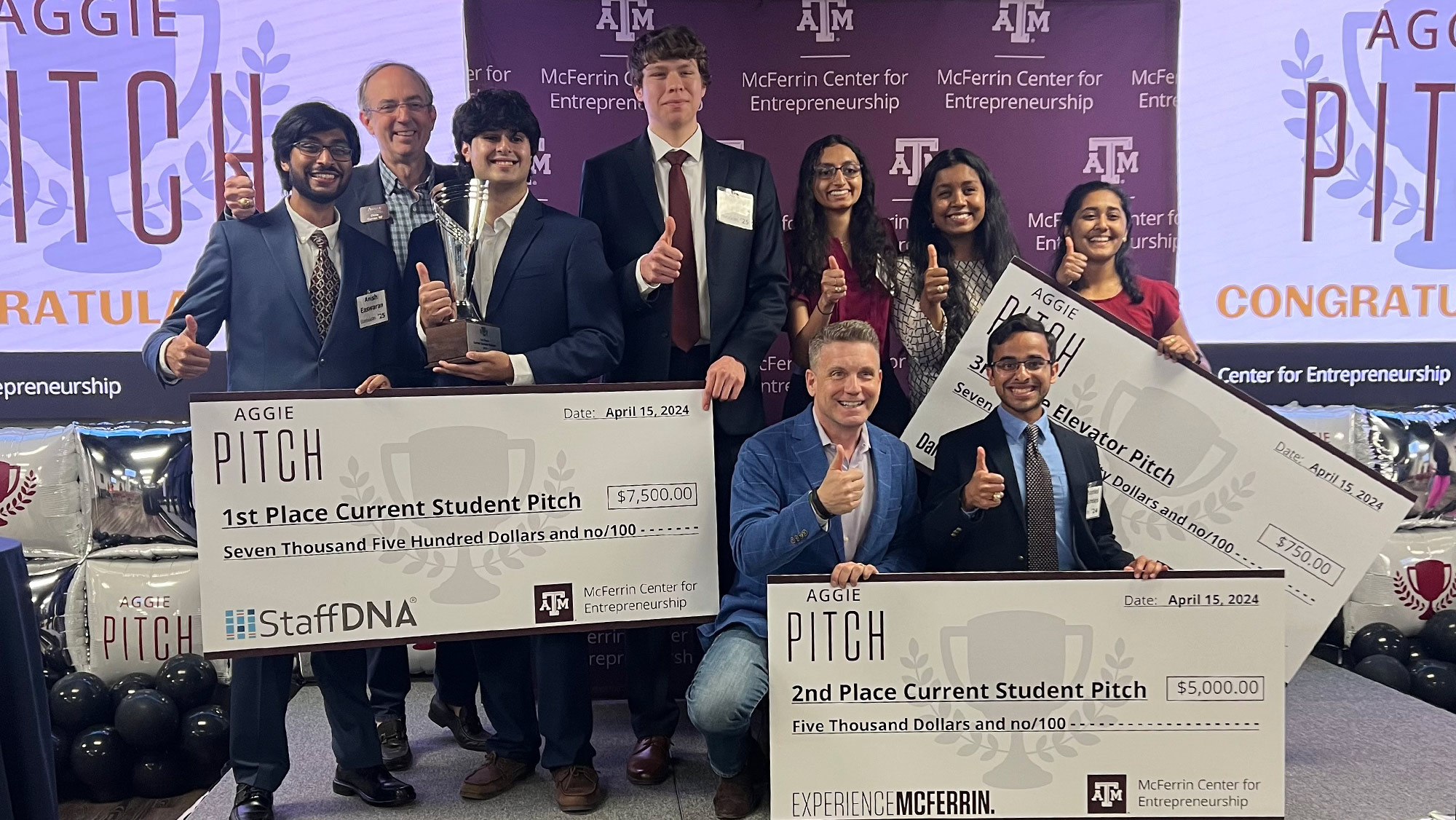
The McFerrin Center for Entrepreneurship hosted the sixth annual Aggie PITCH competition, providing current and former Texas A&M students a platform to display their business startup ideas. Each year, the university-wide contest highlights entrepreneurial talent in the College of Engineering.
Between the three different competition areas — current student full pitch, former student full pitch and elevator pitch — nine teams were awarded a total of nearly $30,000 in cash prizes. These monetary awards, paired with invaluable networking opportunities, industry feedback and personal mentorship, help participants in the competition gain what they need to make their startup idea an effective, operational business.
Three College of Engineering teams left with top prizes, including the first and second-place titles for the full pitches of their startups.
All members of first place team ElastaScan — Anish Easwaran, Richard Balbin and Kaushik Avadhanula — credited their membership in Engineering Inc., the College of Engineering’s student incubator, to their success.
“Engineering Inc. was invaluable to our success, allowing us to develop our business fundamentals to a deeper level,” explained Anish Easwaran, a junior biomedical engineering student and member of team ElastaScan. “Professor Curran and the community of students have all been very supportive. It was amazing to be surrounded by and collaborate with so many like-minded individuals.”
Their winning idea centered around a band equipped with the capability to detect muscle contractions and stiffness, allowing for the precise analysis and mapping of motions during exercise. Richard Balbin, a junior biomedical engineering student, shared what sparked his motivation to begin the entrepreneurial endeavor.
“Dealing with knee pain in high school, I went to physical therapy and struggled after completing my planned course of treatment without any improvement,” explained Balbin. “ElastaScan emerged as a solution for a pain point in my and millions of other Americans’ lives. This tool can prove to be valuable for physical therapists where subjectivity is currently the standard.”
Nathaniel Fernandes, a pre-med computer engineering student, won second place in Aggie PITCH’s current student full pitch with his AI invention, EHR Buddy.
“EHR Buddy’s mission is to help doctors get paid on time and hassle-free by developing a Grammarly-like assistant for physicians,” described Fernandes. “Using AI and natural language processing to proofread clinical notes before they are submitted to insurance companies, physicians are given suggestions that will both reduce the number of claims denied by insurance companies and increase the value of each submitted claim.”
Fernandes acknowledged those who supported him as he workshopped and refined his startup.
“Without a shadow of a doubt, I know I would not have won without the mentorship of Chris Curran, Chris Westfall and many other incredible professors of practice,” Fernandes reflected. “They believed in me even before I believed in myself, thus giving me the confidence I needed to share my ideas and story with the world.”
Also focused on addressing a critical issue within the medical industry, Fouzul Kansul, Rachel Kurian, and Abhinaya Muruganandham clinched third place in the elevator pitch segment of the competition with their innovative startup, SpoonTrack.
Tailored for organ transplant recipients, the product features a portable medication dispenser, a sensor-equipped spoon for verifying intake, and a mobile app that shares data with healthcare providers to ensure medication adherence.
“With medication nonadherence being a leading cause of organ transplant rejection in the United States and costing our healthcare industry $300M+ a year, we wanted to create an easier way to monitor medication intake for both the patient and the provider at any time,” said Fouzul Kansul, a member of the team and biomedical engineering junior.
Unlike the full pitches, the elevator pitch allows students one minute or less to present their startup without the use of presentation materials or a Q&A to clarify their ideas. Instead of being scored by the judges, this segment of the competition is evaluated by the audience at large.
“I’ve learned that convincing a crowd in less than 60 seconds is hard!” Kansul reflected. “However, my experience with Aggie PITCH has shown me how rewarding this process can be and has given me a greater sense of appreciation for pitch design and presentation.”